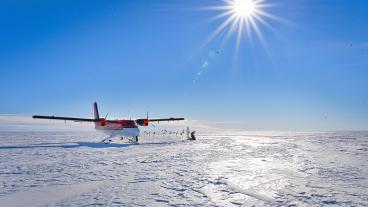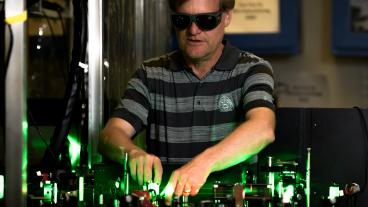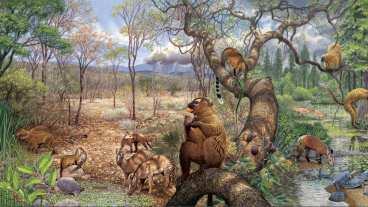With plenty of humor, Physics Professor Reuben Collins shared insights into the world of academic publishing, particularly the challenges it is facing, via his Faculty Senate Distinguished Lecture on March 26.
Collins opened with the story of how he came to be editor-in-chief of Applied Physics Letters. A year-and-a-half ago, “I was interested in trying something different,” he said. He’d always enjoyed writing, so he took up an offer to update a textbook. Then a colleague called and asked him to apply for the APL post.
“I didn’t know what that was,” Collins said. “So I said ‘yes.’”
He was offered the job last summer and – because he was new to editing a large journal – started as an associate editor, reviewing papers. He then took over as top editor in September. “That’s when I realized what I had said ‘yes’ to,” Collins said.
As editor-in-chief, Collins is responsible for setting the direction of the journal, defining standards and maintaining ethics, hiring and managing staff, and overseeing the process of reviewing papers. But his favorite duty, Collins said, is “I get to pick the cover art.”
Above all, Collins’ job is making sure Applied Physics Letters “services the community represents.” And that comes with plenty of challenges.
“We live in a metric-happy world,” Collins said. “We want to reduce everything to one number.” He shared the story of a friend whose work for the past year – papers, conferences, lab accomplishments – was summed up in one phrase that would determine her pay: “2-plus.” For colleges and universities, that might be ranking in U.S. News and World Report.
In the field of scientific journals, that all-important metric is “impact factor,” determined by the average number of citations received for each paper a journal published in the previous two years.
Unfortunately, some journals are rejecting most of the papers they receive even before sending them out for review, in an effort to increase their impact factor, Collins said. He implied that this was a disservice to the scientific community, given that out of all these rejected papers, surely some were worthy of publication.
But some journals have found a balance, Collins said – publishing many papers, which is good for the community; earning many citations, which benefits both the author and the community; and rating a high impact factor, which benefits the journal and authors.
Collins calls these “Good Science Citizen Journals,” a group he doesn’t put Applied Physics Letters in just yet. He said APL is still publishing too many papers, and many that don’t receive citations. “I want to move us into the good citizenship zone.”
Competition from the big science publishers is another challenge, with so many new journals being launched on what seems like a monthly basis. There’s also the push for open access – where the public can read and use publicly funded scientific research for free. Collins has also seen plagiarism, double-publishing, and other ethical issues crop up as editor-in-chief.
One current problem that will eventually turn into a boon for publishers is globalization, Collins said. In recent years, China has become a leading producer of scientific papers, though most of them end up unpublished. He sees this changing in the future, much like Japan changed its reputation from producer of cheap goods to leading manufacturer of electronics and cars.
“China will do the same thing,” he said. “Publishers have to hitch their wagon to that.”
The Faculty Senate Distinguished Lecturer Award, established in 1990, is an opportunity for faculty to honor outstanding colleagues. Recipients are selected from faculty nominations, and are invited to present on a topic of their choice. They also receive a plaque, and a gift to their discretionary account.
In addition to serving as professor and APL editor-in-chief, Collins is associate director of the Renewable Energy Materials Research Science and Engineering Center, and director of the Center for Solar and Electronic Materials.
Contact:
Mark Ramirez, Communications Specialist, College of Applied Science & Engineering | 303-384-2622 | ramirez@mines.edu
Karen Gilbert, Director of Public Relations, Colorado School of Mines | 303-273-3541 | kgilbert@mines.edu
Kathleen Morton, Communications Coordinator, Colorado School of Mines | 303-273-3088 | kmorton@mines.edu



